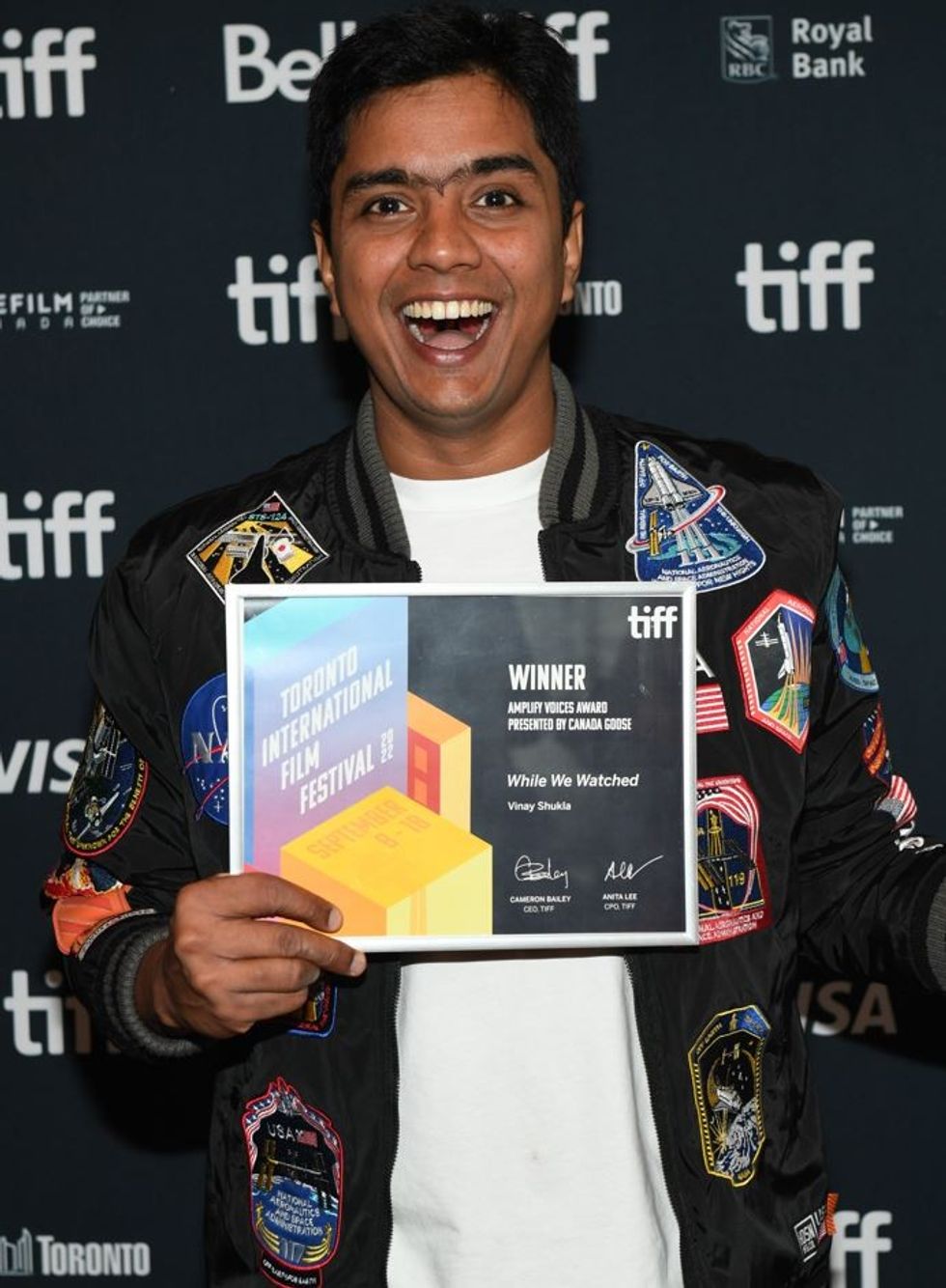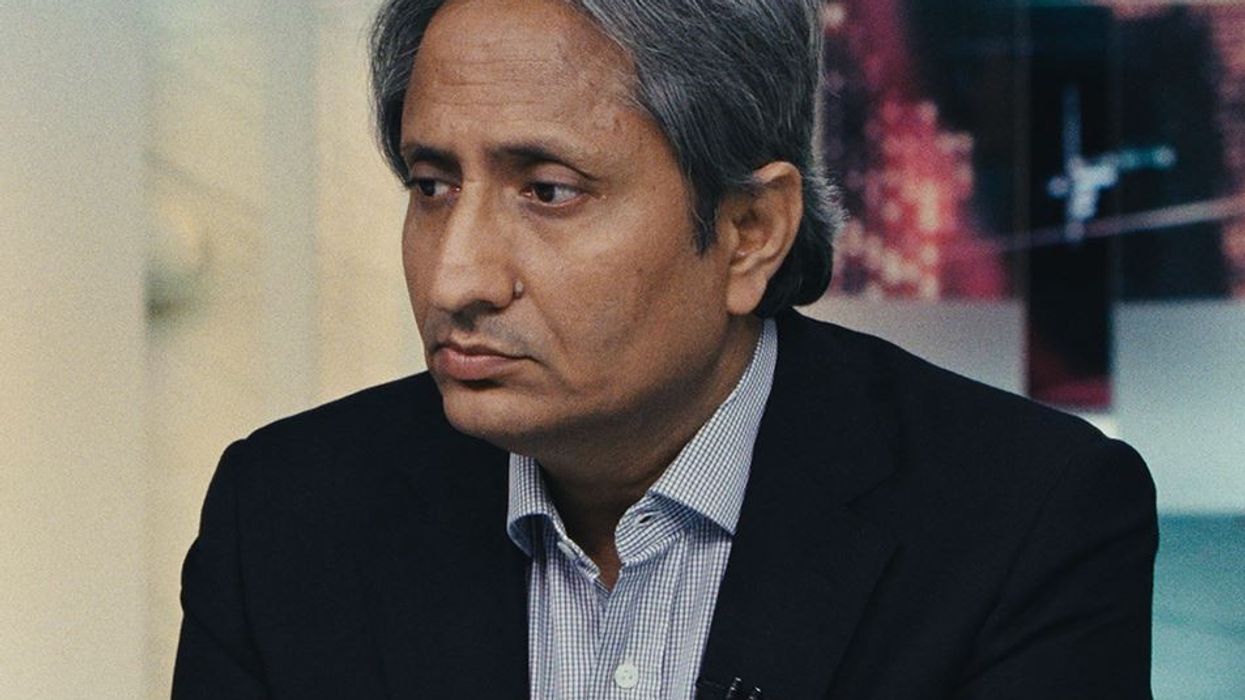INDIAN filmmaker Vinay Shukla said his award-winning documentary, While We Watched, aims to address a “credibility crisis” in the country’s news media.
The documentary follows former NDTV senior journalist Ravish Kumar as he is determined to not become a government mouthpiece or report fake, sensationalised news in order to gain viewers.
In an interview with Eastern Eye, Shukla said, “Unlike other news anchors busy praising their audience, Ravish was actually scolding his audience and telling them to stop watching TV. Here was a vulnerable protagonist, somebody who had seen a better time and was beginning to wonder if he was relevant to his audiences anymore. I found that to be this delicious irony of somebody who’s on TV, who’s asking his audiences to stop watching TV.”
When he first approached Kumar, Shukla said the former TV anchor was moving around with a bodyguard due to threats on his life from political figures and their followers. Kumar had been at NDTV for 26 years and he resigned just a few hours after millionaire businessman Gautam Adani said he would acquire the broadcaster.
Announcing his resignation, Kumar said, “There was never a golden age in Indian journalism. But it was never as bad as it is today. Everyone claims to be a jounalist today. Especially those who are close to and even aligned with the powerful. These faces and establishments ironically are the very reason journalism is being trampled upon in this country.

“They claim to do good journalism. I implore you to be sceptical of them. What we have today is truly the dark age of journalism. There are numerous news channels in India but all of them have compromised on their ethics. Our media ecosystem has been gutted and destroyed.”
Despite the growing popularity of digital media, especially among India’s urban and educated population, television remains the most popular source of news, overall.
India has more than 400 news channels, dominated by regional language channels and private players. Broadcast television channels, like print media in India, are self-regulated and often have strong political affiliations and corporate ownership, with no regulations on cross-media ownership.
And a culture of 24×7 news channels operating on breaking news models and polarised debates often leads to distorted reporting and sensationalised news.
Shukla said, “Watching the news was making me very anxious and I was resigned to losing faith in it. My friends said they were feeling similarly anxious.
“A lot of people told me they don’t watch the news anymore. I found that worrying because news is a major system of public information and I wondered why is it that we’re cutting ourselves off?
“I wanted to make a new kind of news prism which reflected the anxiety I felt as a news watcher.”
Shukla’s film, which was shot for 10-12 hours a day over a span of two years, offers an insight into Kumar’s life as the head of a bustling newsroom.
“Ravish usually wakes up and writes a 5,000-word essay on Facebook in the morning. In the evening, he would write his own broad[1]cast. In a day, he would write about 20,000 words. He will also be talking to people, probably a hundred phone calls every day,” said the filmmaker whose previous documentary, An Insignificant Man, chronicled the rise of the Aam Aadmi Party under Delhi chief minister Arvind Kejriwal.
Shukla said, “I wanted to lift the veil on the sort of unseen workings of a newsroom. All the chatter, opinions people have about the news or how it should be, they have little idea about how newsrooms work from within.
“This film is also an attempt to humanise the process of journalism. Once you understand a system, you have information which makes us well equipped.”
Shukla conceded he faced a dilemma of making a film about news for an audience where many don’t trust the news anymore.
He said, “I was conscious that people don’t necessarily trust the news nowadays. I knew it was going to be a challenge for me to make a film wherein people let their guard down.
“I had to work on finding an emotional truth that would resonate with people right from the beginning. My only ambition was to make the audience, who had been completely desensitised to news, to sensitise them again.”
He said about Kumar, “Ravish is incredibly curious. He’s probably one of the most curious people I’ve ever met. He can get fascinated by the smallest of things.
“People ask me how it was to shoot the documentary; honestly, it was very enjoyable. I was often in high-pressure situations with a character who is a very curious about the world and how it functions. If you can be curious for life, then you can be fuelled by it.
“He is one of the only rare people who I have met who are fuelled by their curiosity.”
After leaving NDTV (regarded as a trusted channel, according to a study by Oxford University and the Reuters Institute for the Study of Journalism), Kumar set up his own YouTube Channel where he broadcasts and has already built a following of 6.22 million subscribers. Shukla believes While We Watched has become “more timely” following Kumar’s resignation.
“The film is not necessarily a meditation about Ravish on NDTV and why he should or should not be there. It’s about adult loneliness and the difficulties one has to endure through the choices they make in their careers, those who go against the mainstream current,” he said.
Asked about Kumar’s reaction to the documentary when he watched it, Shukla said the journalist was “very distant”.
“It felt like he wasn’t affected by it, He was like ‘It’s all right’. It’s always difficult to watch a film about yourself and respond. It is a bit of an out-of-body experience I have been told by a lot of people to watch a film about yourself.”
Shukla said his goal is to shine a spotlight on systems that affect humanity and despite his previous film on the Aam Admi Party, insisted he is no expert in politics. “While We Watched is my love letter to journalism. It’s an urgent newsroom horror film, there is a story of hope hidden deep inside layers of personal loneliness,” he said.
“First, until we have a better system for journalists within the news organisation, we can’t have better journalism. Second, in this world of complex problems, we need journalists who are trained in complexities.
“Finally, there has to be a forum between the people, the government and the newspapers wherein there can be some sort of a better regulatory mechanism. There is far too much amount of privilege and power. There has to be accountability on the news organisations, especially on those who we know are causing damage,” he added.
While We Watched won the Amplify Voices Award at the 2022 Toronto International Film Festival. It also won the Cinephile Award at the 2022 Busan Film Festival. It releases in the UK on Friday (14).




